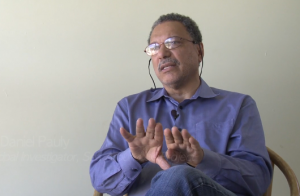 Daniel Pauly discusses catch shares in this post and video excerpted from an interview given during the Gulf and Caribbean Fisheries Institute Conference in November 2009.
Daniel Pauly discusses catch shares in this post and video excerpted from an interview given during the Gulf and Caribbean Fisheries Institute Conference in November 2009.
May/June 2010 Newsletter
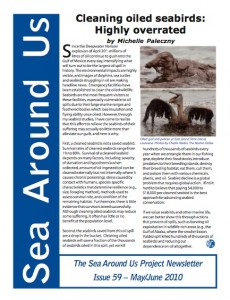 Read about the high cost of cleaning oiled birds, shifting baselines, and Sarika Cullis-Suzuki’s impressions from her participation in the United Nations Fish Stock Review Conference in the May/June newsletter.
Read about the high cost of cleaning oiled birds, shifting baselines, and Sarika Cullis-Suzuki’s impressions from her participation in the United Nations Fish Stock Review Conference in the May/June newsletter.
Whale Watching: Worth a Lot
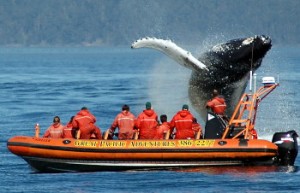 A new study by authors from the Fisheries Economics Research Unit and the Sea Around Us Project shows that whale watching is a booming industry and a good alternative to whaling. Based on ecological and socio-economic criteria, whale watching could generate an additional US$413 million in yearly revenue, supporting 5,700 jobs. Together with current global estimates, this would bring the total potential for the whale watching industry to over US$2.5 billion in yearly revenue and about 19,000 jobs around the world. The research was covered widely during the IWC meeting. Read, for instance, this piece at Discovery News.
A new study by authors from the Fisheries Economics Research Unit and the Sea Around Us Project shows that whale watching is a booming industry and a good alternative to whaling. Based on ecological and socio-economic criteria, whale watching could generate an additional US$413 million in yearly revenue, supporting 5,700 jobs. Together with current global estimates, this would bring the total potential for the whale watching industry to over US$2.5 billion in yearly revenue and about 19,000 jobs around the world. The research was covered widely during the IWC meeting. Read, for instance, this piece at Discovery News.
Reference: A.M. Cisneros-Montemayor, U.R. Sumaila , K. Kaschner , D. Pauly (in press) The global potential for whale watching. Marine Policy.
Legislators Meet to Strategize on Global Fisheries Decline
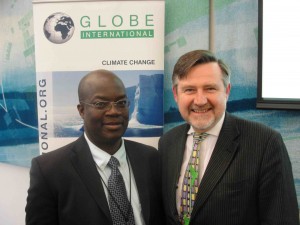 On June 8, World Ocean’s Day, 40 senior Members of Parliament from 15 key fishing nations agreed on a new plan to reverse the decline of global fisheries. The meeting was organised by the Global Legislators Organisation for a Balanced Environment, (GLOBE) to challenge the current international political failure to address the rapid decline of global fisheries stocks. Among the politicians were scientific and policy advisors, including the Sea Around Us Project’s Rashid Sumaila (photographed here with GLOBE Fisheries Commission Chairman and former UK Biodiversity Minister, Barry Gardiner MP).
On June 8, World Ocean’s Day, 40 senior Members of Parliament from 15 key fishing nations agreed on a new plan to reverse the decline of global fisheries. The meeting was organised by the Global Legislators Organisation for a Balanced Environment, (GLOBE) to challenge the current international political failure to address the rapid decline of global fisheries stocks. Among the politicians were scientific and policy advisors, including the Sea Around Us Project’s Rashid Sumaila (photographed here with GLOBE Fisheries Commission Chairman and former UK Biodiversity Minister, Barry Gardiner MP).
The group agreed to the following Priority Actions:
Parliamentary Legislation
• Ratify and adopt robust implementing legislation for all existing UN and FAO international fishery agreements.
• Redirect inappropriate fishing subsidies into programmes that improve fisheries management.
• Implement flexible rights-based management schemes for both coastal and high seas fisheries.
• Prevent fisheries authorities from setting catch limits above scientific recommendations.
• Involve the fishing industry in data collection and co-management of fisheries.
• Mandate environmental impact and stock assessments for all commercially fished species.
• Integrate fisheries and environment policy within government.
• Provide economic incentives for industry initiatives to source legal and sustainable fish.
• Introduce legislation to ban the import and domestic trade of illegally-caught fish (e.g. US Lacey Act).
• Implement a ‘Cap and Restore’ approach for all severely depleted fisheries.
• Adopt modern MPA network targets to propel domestic implementation of MPAs that link in to national and regional networks, alongside comprehensive fisheries management outside of protected areas.
RFMO Members
• Review and reform of RFMO conventions to promote sustainable, ecosystem-based management of marine biotic resources.
• Construct new RFMOs or expand existing RFMOs to manage species and areas currently unmanaged.
• Implement UNFSA requirements for a precautionary, ecosystem-based approach.
• Agree new RFMO rules that prevent decision-making bodies from setting catch limits above scientific recommendations.
• Incentivise RFMO membership by linking it to capacity-building assistance, and agree economic sanctions against non-compliant states.
• Establish RFMO mandates for all flag states to ensure their vessels carry tamper proof monitoring and surveillance equipment.
Coastal and Port States
• Increase and harmonise sanctions against illegal fishing and transhipment vessels across coastal and port states in key regions.
• Establish regional agreements for sharing data on fishing activities and resources for monitoring and enforcement, especially in developing country coastal and port states.
International Actions
New Agreements
• Mandate the UN to review and monitor RFMO performance based on existing benchmark standards for RFMOs in the UNFSA.
• Support the development of a multilateral and enforceable agreement on fishing subsidy reform within the World Trade Organisation.
• Require all fishing and reefer vessels to carry unique identification, such as IMO numbers.
• Hold non-compliant states accountable using the International Tribunal on the Law of the Sea.
• Adopt modern MPA network targets to propel the creation of marine reserves and networks globally.
• Investigate a new Global Framework Agreement for Marine Spatial Planning in areas beyond national jurisdiction.
New Multilateral Institutions
• Continue and increase support for the International Monitoring Control and Surveillance Network, expanding its mandate to conduct and coordinate global high seas fisheries intelligence-gathering.
March/April 2010 Newsletter
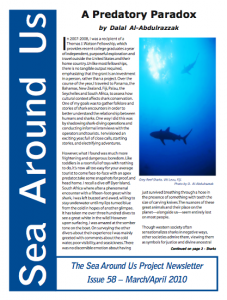 Read about sea turtles, sharks, and Sea Around Us member research in the March/April newsletter.
Read about sea turtles, sharks, and Sea Around Us member research in the March/April newsletter.

